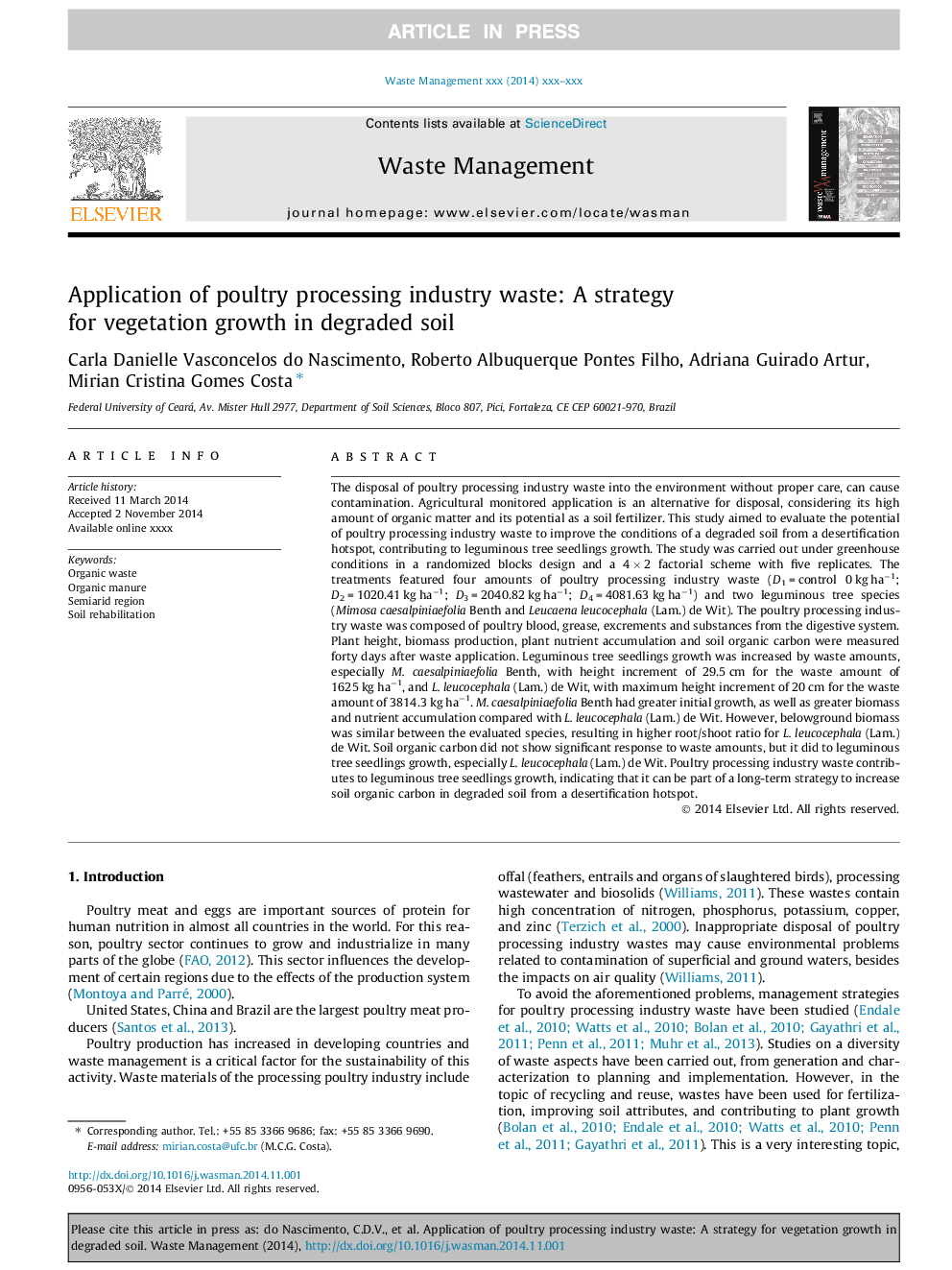| کد مقاله | کد نشریه | سال انتشار | مقاله انگلیسی | نسخه تمام متن |
|---|---|---|---|---|
| 6354986 | 1622649 | 2015 | 7 صفحه PDF | دانلود رایگان |
عنوان انگلیسی مقاله ISI
Application of poultry processing industry waste: A strategy for vegetation growth in degraded soil
ترجمه فارسی عنوان
استفاده از زباله های صنعت پردازش مرغ: یک استراتژی برای رشد گیاه در خاک تخریب شده
دانلود مقاله + سفارش ترجمه
دانلود مقاله ISI انگلیسی
رایگان برای ایرانیان
کلمات کلیدی
ضایعات طبیعی، کود آلی، نیمه دولتی، توانبخشی زمین،
موضوعات مرتبط
مهندسی و علوم پایه
علوم زمین و سیارات
مهندسی ژئوتکنیک و زمین شناسی مهندسی
چکیده انگلیسی
The disposal of poultry processing industry waste into the environment without proper care, can cause contamination. Agricultural monitored application is an alternative for disposal, considering its high amount of organic matter and its potential as a soil fertilizer. This study aimed to evaluate the potential of poultry processing industry waste to improve the conditions of a degraded soil from a desertification hotspot, contributing to leguminous tree seedlings growth. The study was carried out under greenhouse conditions in a randomized blocks design and a 4 Ã 2 factorial scheme with five replicates. The treatments featured four amounts of poultry processing industry waste (D1 = control 0 kg haâ1; D2 = 1020.41 kg haâ1; D3 = 2040.82 kg haâ1; D4 = 4081.63 kg haâ1) and two leguminous tree species (Mimosa caesalpiniaefolia Benth and Leucaena leucocephala (Lam.) de Wit). The poultry processing industry waste was composed of poultry blood, grease, excrements and substances from the digestive system. Plant height, biomass production, plant nutrient accumulation and soil organic carbon were measured forty days after waste application. Leguminous tree seedlings growth was increased by waste amounts, especially M. caesalpiniaefolia Benth, with height increment of 29.5 cm for the waste amount of 1625 kg haâ1, and L. leucocephala (Lam.) de Wit, with maximum height increment of 20 cm for the waste amount of 3814.3 kg haâ1. M. caesalpiniaefolia Benth had greater initial growth, as well as greater biomass and nutrient accumulation compared with L. leucocephala (Lam.) de Wit. However, belowground biomass was similar between the evaluated species, resulting in higher root/shoot ratio for L. leucocephala (Lam.) de Wit. Soil organic carbon did not show significant response to waste amounts, but it did to leguminous tree seedlings growth, especially L. leucocephala (Lam.) de Wit. Poultry processing industry waste contributes to leguminous tree seedlings growth, indicating that it can be part of a long-term strategy to increase soil organic carbon in degraded soil from a desertification hotspot.
ناشر
Database: Elsevier - ScienceDirect (ساینس دایرکت)
Journal: Waste Management - Volume 36, February 2015, Pages 316-322
Journal: Waste Management - Volume 36, February 2015, Pages 316-322
نویسندگان
Carla Danielle Vasconcelos do Nascimento, Roberto Albuquerque Pontes Filho, Adriana Guirado Artur, Mirian Cristina Gomes Costa,
